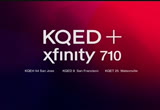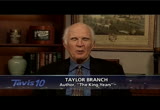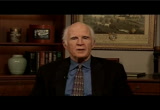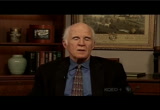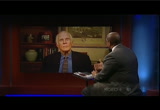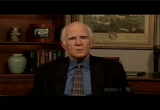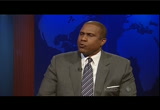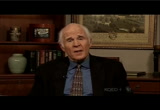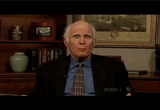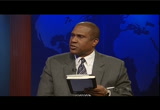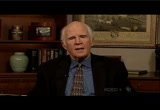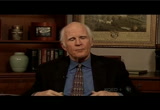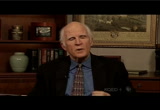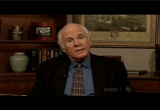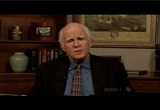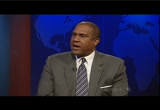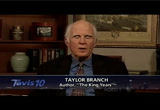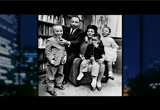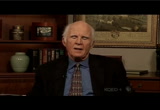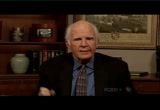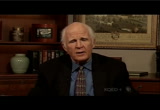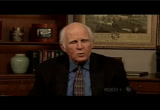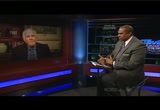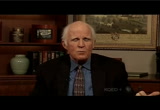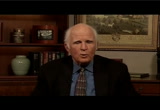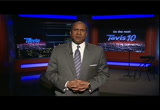tv Tavis Smiley PBS March 23, 2013 12:00am-12:30am PDT
12:00 am
tavis: good evening. from los angeles, i am tavis smiley. tonight, a conversation with pulitzer prize-winning author taylor branch, and his latest text, "the king years: historic moments in the civil rights movment," transforming those turbulent years into what is being called a brilliant compendium. we are glad you could join us for our conversation with taylor branch, coming up. >> there is a saying that dr. king had that said there is always the right time to do the right thing. i just try to live my life every day by doing the right thing. we know that we are only about halfway to completely eliminate hunger, and we have a lot of work to do. walmart committed $2 billion to fighting hunger in the u.s. as we work together, we can stamp hunger out.
12:01 am
>> and by contributions to your pbs station from viewers like you. thank you. tavis: taylor branch is, of course, the brilliant writer of the trilogy "the king years." story distilled the epic into one book. it is called "the king years: historic moments in the civil rights movment." he joins us from washington. on the good to have you program. >> i wish i could be with you. wish we could have you
12:02 am
in the studio. you have spent basically your life working on this icon a trilogy, and then you end up with a book that basically distills it all down. why did you do this? >> teachers have told me for many years that while they love the story, 800-page books are a little much to assign college students, let alone high school, and that weighed on me. the other thing is that it has been 50 years since the crest of the movement, and america's still does not really appreciate how much we benefit from that -- america still does not really appreciate how much we benefit from that. there are still many people hiding from the great benefits of the 1960's, so i wanted to do something to crystallize that. the lessons from the people in the civil rights era. tavis: what lessons do you think
12:03 am
that the american public, by and large, as we approached the anniversary -- we will talk about that in a moment -- what do they still seem blind to? >> george wallace pledged segregation forever. this country was segregated. all through the south, in the constitutions of the southern states, there was not a single public official that advocated the end of segregation. now, that is gone. has that benefited african-american citizens to the point that we have one now in the white house, but it has benefited women, the disabled, senior citizens, and even, of course, the white south, when it was invested in segregation, it was the poorest region in the country. you had never heard of the sun belt, and it has benefited
12:04 am
tremendously from the part of ending that. the doors of equal citizenship are really appreciated much more around the world than they are here in the united states. tavis: i am struggling try to recall the name of a major university, and i have forgotten what i am thinking of at the moment, but it made national news, because it discovered that this president, a beneficiary of all of the sacrifice and struggle, president obama has benefited from that, and he has talked less about race than any president in recent memory, and the study details what other presidents have had to say about race, and he has had less to say about it than others, including republicans. is him being black in itself
12:05 am
making a statement? have because you, one, done the war, and, two, you have had occasion -- you have done and, two, you have had occasion to be there. races talked less about than any present -- president in recent memory. >> first, it does not surprise me, and that does not mean that other presidents have talked much about race, because they avoid it. he is smart. he knows that an awful lot of people voted for him as a black president because they felt they were ready to make a racial change only on their terms, and if he talks about race, they get upset. -- he has to do is mention trayvon martin, people go
12:06 am
ballistic. it's still drives our politics, are voting patterns, -- it still voting our politics, our patterns. it is still an important barometer of politics in the united states, but for that very reason, it is a gateway. if you are comfortable, and you get outside of yourself, and human progress, as they did in the 1960's, it -- and human progress, as they did in the 1960's, it goes beyond. as toare great lessons how citizens can organize to call on the patriotic heritage of the country to tackle our most intractable problems, and we need to do that again. tavis: i am glad you have said that. what other movements for justice and freedom and rights in this
12:07 am
country have learned from the civil rights era? i have always seen the civil- rights era as the litmus test, my words, not yours, i have seen that as the high-water mark that other movements have taken their cues from, he it women, be it gays and lesbians, -- be it women, be it gays and lesbians, be it animal rights activists. >> it is the gateway to freedom. when the black movement showed the way, it inspired other movements about equal citizenship and what it really means, what dr. king meant by equal souls and equal votes. people have learned, first of all, that you do not wait for leadership. it is about citizenship. , the most inspirational thing about the black movement is that the -- the most important --
12:08 am
inspirational thing about the black movement is that they found a way to move the country forward by marching and communicating and that young people could be involved in back, old people, anybody, sharecroppers, -- young people could be involved in back, old people, anybody. -- involved in that. women followed. 50 years ago, it was a far- fetched dream for women to be at princeton and yale, let alone west point, and they did not even go to the university of north carolina, where i was a student. females were not allowed. people forget. had not even been invented. since the african-american movement began to open those doors, gay people have gone
12:09 am
from literally the crime that dare not even speak its name to a period where we are now talking about open gay marriage, so these are very, very inspirational things, but we need to be constantly reminded that it was the african-american movement that opened the doors for the other movements. tavis: one reason we have to be reminded is that students are not taught this in school. the distillation of the trilogy that you did about the king years, the first answer was that teachers have been saying to you over and over again that they need something to assign to their students, high school students and college students, and i am not naïve, taylor, in asking this question, but even when the documentation exists for them to do otherwise, why is it that our students are not talk more about this history?
12:10 am
if you regard this as seminal history, as important to the experience of america growing not just older but wiser and more mature, why are not students taught more of this in public education? >> well, first of all, it is controversial. ?avis: what is controversial if it is a fact of what happens, what are the facts controversial? >> there are a lot of people in denial, of the facts. -- in denial of the facts. there are an awful lot of people that despise government precisely because it opened the door for common citizenship, for people of all races and nature is in the united states, so it is still controversial, but it is beyond that, tavis. our country measures schools, by the way they teach math and the
12:11 am
way they teach reading. not history. history is the key to citizenship, and because we do not teach this, we are in danger of having people coming of age that do not understand this, he and the civil-rights era -- this, and the civil-rights era is one to show how people use their citizenship to change the nation for the better. we lose a lot by not transmitting it, and we cannot blame the kids. they do not get this history through the umbilical cord. a lot of people were embarrassed by being racist, other is embarrassed by -- there are barriers to psychological readiness, but what we have to understand is that through those barriers is where we really make our greatest progress, and that is what the 1960's were really about, and that is, to me, and
12:12 am
enthralling lights worked -- an enthralling life's work. tavis: you and i, i suspect, will be talking about all of the seminal moments. we will run that list in a few minutes, but what is the long- term danger to our democracy if we never come to terms with this history? we have never done it as yet in half a century. what is the long-term damage if we do not come to terms with it? >> the long-term damage is, and we can learn this from history, where racism is involved, there is a pronounced and proven tendency in the united states for the majority culture to member historyre and turned it around. what does that mean?
12:13 am
i was taught that the civil war had nothing to do with slavery and that the people of new reinstated white supremacy in the south where, in my textbooks -- the people who reinstated white supremacy, in the south, in my text book, -- textbooks, they were redeemers. that is what they were called. we gave it a gloss. it was taught that the klan was a benevolent organizations. we can turn history upside down. we have done it for a century. a lot of people still do not have an accurate view of the civil war and what it was about. i have argued that we have misremembered the 1960's for years. george wallace invented a lot of
12:14 am
the terminology we have about big government and pointy headed liberals and a biased media being in cahoots with politicians, trying to centralize all power in washington. an anti-government distemper. it is not a judgment. it is just a hostility to government that we are still living with the that is very dangerous to any sort of balance or any sort of purpose, even a patriotic purpose. the history of american patriotism is figuring out ways we can work together to move forward and me together, knit together the, and government -- knit togetherther, the common government . they think a key to their survival is a gun in the closet, and that has never been true. you cannot show that in american history. that shows how atrophied in many
12:15 am
respects this is. if we do not remember our history because we are running from it, we do ourselves a great disservice. misremembering, taylor, involves sanitizing and taming who martin king was. i have raised the subject before and will raise it again. you and i have discussed this before, certainly in our private conversations, about whom martin martin king really was. you can do that with holidays, and i support all of them, but i have said before that i am fearful of what will happen this year and as we start the journey, over the next five minutes, commemorating selma,
12:16 am
montgomery, the girls killed in the church, and the voting rights act, and the civil rights act -- i am concerned that we will get so caught up in the pomp and circumstance of celebration that we misremember. one of my friends says "accidentally on purpose." butelebrate this monument, we never really come to terms with the radical believes that martin kaymer really had about how to turn this country around. reallymartin -- we never come to terms with the radical really that martin king had to say about how to turn this country around. >> there is an effort to sanitize any historical icons,
12:17 am
whether it be george washington chopping down a cherry tree or martin luther king. but i think there is even more in the case of king, because people do not want to take him as the real problem of democracy for his time, he said democracy is about votes, votes are about -- tackling all of what he's scourges, called violence of the flesh and violence of the spirit. that is a very, very prophetic message. it was not easy. we were never comfortable with that. he was never an up close and personal figure in the united states. you see is psychologically for people to say, "that is wonderful. he said "i have a dream," and we have reached the dream."
12:18 am
things that do not apply any more. but, really, martin luther king was a leader. that is one of the great things about lyndon johnson's speech. everybody remembers that he duringwe shall overcome" the selma march. he said there are times when destiny and freedom come together in a single moment, and that was as it was in appomattox during the civil war, and so it was in selma. johnson is welcoming a black-led movement, from the revolution to the civil war, but to the vanguard of it, a non-violent movement, saying this is showing us what our principles mean, and that is a very, very profound and radical memory, and i think people want to forget that as much as they want to sanitize martin luther king.
12:19 am
tavis: yes. tell us about the 18. you have whittled them down. you picked 18 historical moments that basically turned this country during the civil rights era. i know we cannot go through all of them. my question i guess is how you settled on these 18 monumental moments in our history. >> well, first of all, i have to say that since i had to eliminate 95% of what i wrote, there was a lot of blood on the floor, and it was not easy. what i tried to do was to pick moments that delivered the fall span of this transformative era, when movement begin the watchword of politics. when movement became the watchword of politics. "spin."-- it is
12:20 am
firstrted with dr. king's speech, where he had 50 minutes notice, and he groped for a message, because that was like a birth of may movement -- where he had 15 minutes' notice, and he groped for a message, because that was like the birth of the movement. people who went there were dealing with the president, the congress, governor wallace, the fbi, all of the branches of government, trying to hold the movement together and enact the voting rights act, so the movement to expand its a lot. dr. king is by no means at the heart of all of the chapters.
12:21 am
there is mississippi. there is one chapter about the pivotal year, 1964, freedom summer. bob moses. outlawe trying to segregation. dr. king is in jail in st. augustine, fla., and in that one summer, partisan politics turned upside down in the united states. the democrats went to the party of solids of segregation that they have been for a century -- the party of solid south the segregation that they had been for a century. segregation that they had been for a century. rights and aes' sign of tyranny in the government.
12:22 am
the first republicans popped up in the south, and the party of lincoln gave way to the party of presumptive white people, so it turned partisan politics on its head in one summer. ofween the far reaches texas and the atlantic ocean in 1964, the very first ones came up. the chapter right in the middle shows how the power of race and the power of this movement really drove partisan politics in ways that people do not appreciate today. that is part of our misremembering. we do not want to remember how powerful a force raised can be in our politics, both for the bad and for the good -- how powerful a force race can be in our politics. tavis: this was really one of the greatest movements, but what does your study of this era say about the through line that
12:23 am
allows us to go from moment to momentum to movement, from moment to moment tim to movement -- from moment to moment jump to movement. movement.ntum to you can talk about drones or others. >> that is a wonderful question. that is what i talked to my students about. i am trying to teach this history myself. the inspirational thing, the college kids, starting in 1960 and the freedom ride, they argued about this all night. what is our responsibility? what is the citizen's role? do we have a role, even if they say we are not citizens and cannot vote? the inspirational thing about evenne like die and nash,
12:24 am
if we are not allowed to vote -- even iflike diane nash, we are not allowed to vote, we can move the country towards a situation where we will be able to vote, and that is what the freedom rides were. she intervened when the first freedom riders were burned and beaten in alabama. she said it violence can stop us, the movement is dead, and she recruited students to take it up. of newg a sense community and getting outside their comfort zone and debating what it really means to be an american, and most of america had no idea that such a profound debate was going on on predominantly african-american college campuses in the 1960's. white he grew up a young,
12:25 am
man in atlanta and somewhere made it his life's passion, his live for, looking at the kings gangis life worked -- work at the king years. his new book is called "the king years: historic moments in the civil rights movment. -- movement." taylor, always glad to have you. >> thank you. tavis: that is our show for this time. see you next time. as always, keep the faith. >> for more information on today's show, visit tavis smiley at pbs.org. tavis: hi, i'm tavis smiley. atn me next time as we look what is being done to reform the juvenile justice system in this country. that is next time on pbs. we will see you then.
12:26 am
>> there is a saying that dr. king had that said there is always the right time to do the right thing. i just try to live my life every day by doing the right thing. we know that we are only about halfway to completely eliminate hunger, and we have a lot of work to do. walmart committed $2 billion to fighting hunger in the u.s. as we work together, we can stamp hunger out. >> and by contributions to your pbs station from viewers like you. thank you. >> be more.
245 Views
Uploaded by TV Archive on

 Live Music Archive
Live Music Archive Librivox Free Audio
Librivox Free Audio Metropolitan Museum
Metropolitan Museum Cleveland Museum of Art
Cleveland Museum of Art Internet Arcade
Internet Arcade Console Living Room
Console Living Room Books to Borrow
Books to Borrow Open Library
Open Library TV News
TV News Understanding 9/11
Understanding 9/11